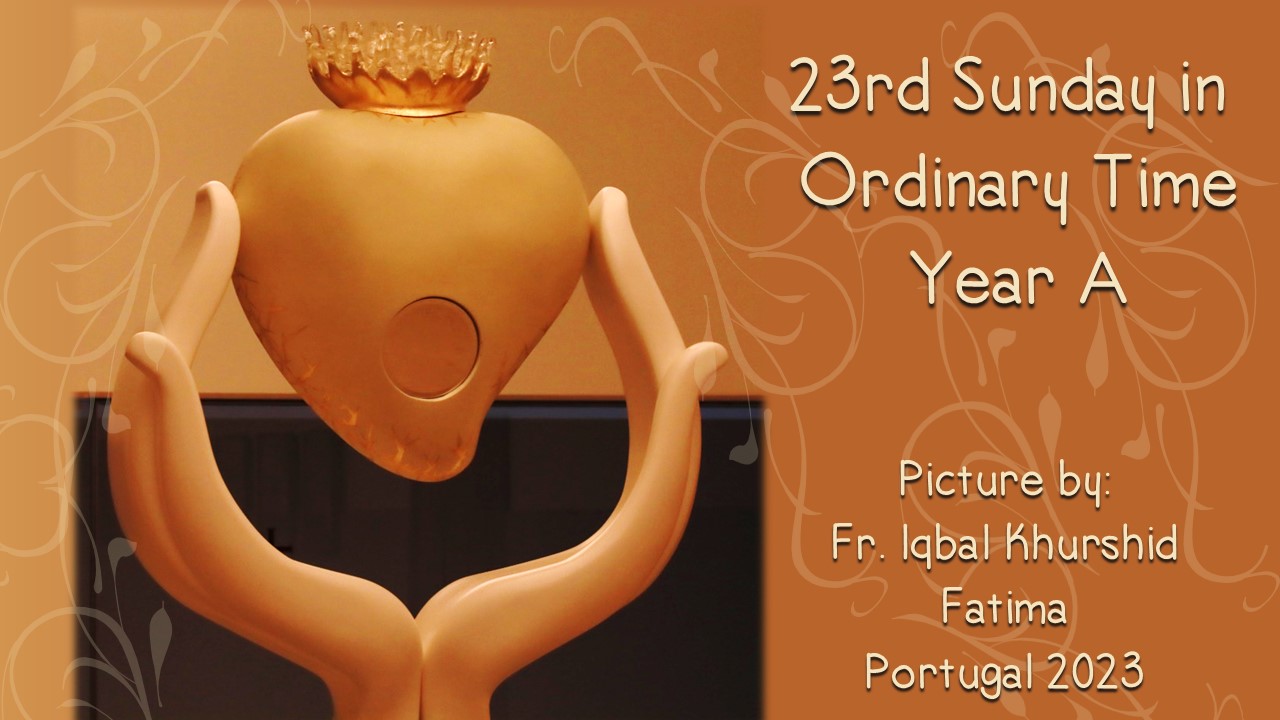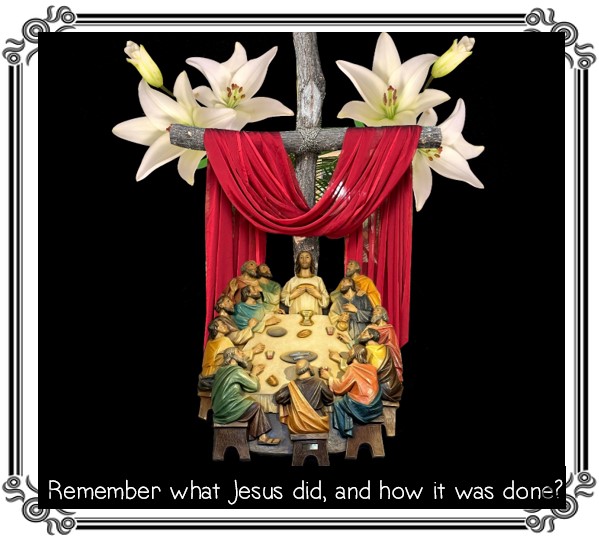
23rd Sunday in Ordinary Time – Year A – September 10, 2023
CORRECTION IS LOVE
We are living in a time and world where three words are starting to lose their importance: listening, obeying and correction. We are so lost in our own world that we don’t want to listen, nor want to obey rules. I believe (you don’t need to agree with me) we are losing our family values, traditions, and respect for elders because we have refused to listen to one another. If there is no value in listening, then how can we obey. If there is no importance in listening or obeying, then how can we accept correction. We have become self-centered and selfish people because we don’t want to be associated with other people. If we refuse to take steps to correct someone or refuse to accept correction, then either way we are going to be big time losers. Let me share a story with you to help us to understand why correction is important if it is done with love and on time.
Once upon a time, there was a young boy. His father had died when he was young. His mother had no one else but her son. Unknowingly she spoiled him by giving him everything he wanted.
One day, he came home from school with another boy’s pencil box. His mother told him to return it, but he refused.
The mother should have told his teacher and corrected her son, but she thought, “After all, he has taken only a pencil box. He will not do it again. How can I scold my son?” Soon, he started stealing all kinds of things from his friends. The mother knew how wrong this was, but she did not feel like scolding or correcting her son.
As he grew up, with no one correcting him, he began to do a lot of wrong things. Soon he joined a band of robbers. One day, he was caught in a robbery. People came to know of all his wrongdoings. He was sent to jail.
As he was being taken away, he saw his mother weeping in a corner. To her shock, he screamed at her, “I am going to jail because of you! When I was young, I did not know right and wrong. If you had taught me, and corrected me, then I would never have become a robber!” (Please read Sirach 30:1-13).
So, never forget that when you are corrected, it is good for you. Remember Correction is LOVE. If Correction is Love, then how would you describe the measure of your love for God and for others? On a scale of 1 to 10, with 1 meaning: “absolutely no love for God and others at all,” and 10 meaning: “a full heart continually overflowing with a deep and profound love for God and other people,” where would you put yourself? Please don’t answer out loud. No holding up Olympic scorecards. No rating each other! Just think about yourself for a moment. How are you doing as regards your own love for God and for other people?
The truth be told, obviously all of us could grow, all of us should grow, in this whole area of love. Jesus taught that love for God and others is the greatest of all the commandments. Love is the identifying mark of the Christian. It is the chief fruit of the Holy Spirit in the believer’s life. The apostle Paul highlighted the importance of love in 1 Corinthians 13 when he said: “Without love I am nothing.” God measures our spiritual growth and maturity first and foremost by our love for Jesus and our love for other people. There is no correction without love. Is it easy to correct someone? I guess not as I already mentioned above.
Someone has explained correction in this way… “For more than fifty years, my dad strove for excellence in his editing. His passion wasn’t to just look for mistakes but also to make the copy better in terms of clarity, logic, flow, and grammar. Dad used a green pen for his corrections, rather than a red one. A green pen he felt was “friendlier,” while slashes of red might be jarring to a novice or less confident writer. His objective was to gently point out a better way. When Jesus corrected people, He did so in love. In some circumstances—such as when He was confronted with the hypocrisy of the Pharisees (Matthew 23)—He rebuked them harshly, yet still for their benefit. But in the case of his friend Martha, a gentle correction was all that was needed (Luke 10:38–42). While the Pharisees responded poorly to His rebuke, Martha remained one of His dearest friends (John 11:5). Correction can be uncomfortable and few of us like it. Sometimes, because of our pride, it’s hard to receive it graciously. The book of Proverbs talks much about wisdom and indicates that “heeding correction” is a sign of wisdom and understanding (15:31–32). God’s loving correction helps us to adjust our direction and to follow Him more closely. Those who refuse it are sternly warned (v.10), but those who respond to it through the power of the Holy Spirit will gain wisdom and understanding (vv.31–32). The Psalmist says “Come, O children, listen to me; I will teach you the fear of the Lord” (Psalm 34:11). How do we usually respond to loving corrections from our heavenly Father? What correction have we received from someone that’s made a significant difference in our life?
In the First Reading Prophet Ezekiel is being entrusted with the most powerful message to help people to turn back from their evil ways and trust in the love and forgiveness of God. The Psalmist says, “But there is forgiveness with you, so that you may be revered”. In the Book of Sirach, we read “How great is the mercy of the Lord, and his forgiveness for those who return to him” (17:29). The role of Prophet Ezekiel was to guide people on the right path and make them understand that there is life if they correct themselves and trust in the forgiveness and mercy of God the Father. However, if someone refuses to accept correction, the result is not good “But you warn the wicked person to turn from their ways, and they do not turn from their ways, they shall die in their iniquity, but you will have saved your life”. Are we doing the same in correcting people and bringing them to the right path?
Holy Father Pope has a wonderful way to explain the Gospel today and he says “The Gospel this Sunday, taken from Matthew, Chapter 18, presents the theme of brotherly correction within the community of believers: that is, how I must correct another Christian when he does what is not do good. Jesus teaches us, should my Christian brother commit a sin against me, offend me, I must be charitable toward him and, first of all, speak with him personally, explain to him what he said or did that was wrong. What if the brother doesn’t listen to me? Jesus proposes a progressive intervention: first, return and speak to him with two or three other people, so he may be more aware of his error; if, despite this, he does not accept the admonition, the community must be told; and should he also refuse to listen to the community, he must be made aware of the rift and estrangement that he himself has caused, weakening the communion with his brothers in the faith”.
The stages of this plan show the effort that the Lord asks of his community to accompany the one who transgresses, so that he or she is not lost. It is important above all to prevent any clamor in the news and gossip in the community — this is the first thing; this must be avoided. “Go and tell him his fault, between you and him alone” The approach is one of sensitivity, prudence, humility, attention towards the one who committed a fault, to avoid wounding or killing the brother with words. Because, you know, words too can kill! When I speak, when I make an unfair criticism, when I “flay” a brother with my tongue, this is killing another person’s reputation! Words kill too. Let us pay attention to this. At the same time, the discretion of speaking to him alone is to avoid needlessly humiliating the sinner. It is discussed between the two, no one is aware of it and then it’s over. This requirement also considers the consequent series of interventions calling for the involvement of a few witnesses and then actually of the community. The purpose is to help the person realize what he has done, and that through his fault he has offended not only one, but everyone. But it also helps us to free ourselves from anger or resentment which only causes harm: that bitterness of heart which brings anger and resentment, and which leads us to insult and aggression. It’s terrible to see an insult or taunt issue from the mouth of a Christian. It is ugly. Do you understand? Do not insult! To insult is not Christian. Understood? To insult is not Christian.
Actually, before God we are all sinners and in need of forgiveness. All of us. Indeed, Jesus told us not to judge. Fraternal correction is a mark of the love and communion which must reign in the Christian community; it is, rather, a mutual service that we can and must render to one another. To reprove a brother is a service, and it is possible and effective only if each one recognizes oneself to be a sinner and in need of the Lord’s forgiveness. The same awareness that enables me to recognize the fault of another, even before that, reminds me that I have likewise made mistakes and I am often wrong.
This is why, at the beginning of Mass, every time, we are called before the Lord to recognize that we are sinners, expressing through words and gestures sincere repentance of the heart. And we say: “Have mercy on me, Lord. I am a sinner! I confess to Almighty God my sins”. And we don’t say: “Lord, have mercy on this man who is beside me, or this woman, who are sinners”. No! “Have mercy on me!”. We are all sinners and in need of the Lord’s forgiveness. It is the Holy Spirit who speaks to our spirit and makes us recognize our faults in light of the Word of Jesus. And Jesus himself invites us all, saints and sinners, to his table, gathering us from the crossroads, from diverse situations of life. And among the conditions in common among those participating in the Eucharistic celebration, two are fundamental in order to go to Mass correctly: we are all sinners and God grants his mercy to all. These are the two conditions which open wide the doors that we might enter Mass properly. We must always remember this before addressing a brother in brotherly correction.
What are the principals to love and forgive others? I think we can understand some of them as follows:
First Jesus doesn’t want anyone to make show of some one’s fault or weakness or in other words no public embarrassment; If your brother or sister sins against you, go and point out the fault when the two of you are alone. If the member listens to you, you have regained that one”. This one has a very strong compact on the person because there is love involved in the element of forgiveness. St. Paul confirms this in these words: “Therefore you have no excuse, whoever you are, when you judge others; for in passing judgment on another you condemn yourself, because you, the judge, are doing the very same things. You say, “We know that God’s judgment on those who do such things is in accordance with truth” (Romans 2:1-2). In the 2nd Letter to the Corinthians St. Paul warns every faithful to be careful not to cause any pain to other “But if anyone has caused pain, he has caused it not to me, but to some extent—not to exaggerate it—to all of you. This punishment by the majority is enough for such a person; so now instead you should forgive and console him, so that he may not be overwhelmed by excessive sorrow. So, I urge you to reaffirm your love for him” (2:5-9). Remember if correction in a positive way, will always lead us to love and love brings us to forgiveness.
Second principle of Jesus is to seek the help of others to correct him/her against the sin being committed: “But if the person does not listen to you, take one or two others along with you, so that every word may be confirmed by the evidence of two or three witnesses”. This is the communitarian spirit of helping other people at fault. In the Acts of the Apostles, we read “they were all united in one heart and mind” and that is only possible if there is love. St. John writes in his First Letter to remind us that if we are children of God, we must listen; “Little children, you are from God, and have conquered them; for the one who is in you is greater than the one who is in the world. They are from the world; therefore, what they say is from the world, and the world listens to them. We are from God. Whoever knows God listens to us, and whoever is not from God does not listen to us. From this we know the spirit of truth and the spirit of error” (4:4-6).
St. John has shown us a real spirit of our discipleship to remind us to live our lives in accordance with the commandments of Jesus; “We know that those who are born of God do not sin, but the one who was born of God protects them, and the evil one does not touch them. We know that we are God’s children, and that the whole world lies under the power of the evil one. And we know that the Son of God has come and has given us understanding so that we may know him who is true; and we are in him who is true, in his Son, Jesus Christ. He is the true God and eternal life” (1John 5:18-20).
Third principle of Jesus is to consult the Church for the correction of our brothers or sisters. Church being the mother, guides her children through the Sacrament of Reconciliation to experience the love and forgiveness of God the Father who slow to anger and abounding in love. Throughout the centuries the Church has experienced the love and forgiveness of her Savior who taught her the biggest lesson of love and forgiveness on the Wood which she passes on to her children. The message of that Wood keeps reminding us that “You shall not take vengeance or bear a grudge against any of your people, but you shall love your neighbor as yourself: I am the Lord” (Leviticus 19:18).
This week Lord is asking us to help those who are in need of correction by loving and forgiving them. Let me conclude my reflection with this story.
There was this Christian who saw a scorpion floundering around in the water. He decided to save it by stretching out his finger, but the scorpion stung him. The man still tried to get the scorpion out of the water, but the scorpion stung him again.
A man nearby told him to stop trying to save the scorpion that kept stinging him.
But the Christian said: “It is the nature of the scorpion to sting. It is my nature to love. Why should I give up my nature to love just because it is the nature of the scorpion to sting?”
Don’t give up loving. Don’t give up your goodness. Even if people around you sting.
Don’t we think where there is love, there is correction and where there is correction there is forgiveness and acceptance?
Other Sermons In This Series

Holy Triduum Year A – April 6-9, 2023
April 06, 2023

5th Sunday in Easter Time Year-A ~ May 7, 2023
May 05, 2023

5th Sunday of Lent – Year C – April 3, 2022
April 01, 2022

